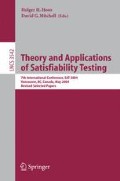Abstract
The Boolean Satisfiability Problem (SAT) is a well known NP-Complete problem. While its complexity remains a source of many interesting questions for theoretical computer scientists, the problem has found many practical applications in recent years. The emergence of efficient SAT solvers which can handle large structured SAT instances has enabled the use of SAT solvers in diverse domains such as electronic design automation and artificial intelligence. These applications continue to motivate the development of faster and more robust SAT solvers. In this paper, we describe the popular SAT solver zchaff with a focus on recent developments.
Access this chapter
Tax calculation will be finalised at checkout
Purchases are for personal use only
Preview
Unable to display preview. Download preview PDF.
References
Cook, S.A.: The complexity of theorem-proving procedures. In: Third Annual ACM Symposium on Theory of Computing (1971)
Kautz, H., Selman, B.: Planning as Satisfiability. In: European Conference on Artificial Intelligence (1992)
Stephan, P., Brayton, R., Sangiovanni-Vencentelli, A.: Combinational test generation using satisfiability. IEEE Transactions on Computer-Aided Design of Integrated Circuits and Systems 15, 1167–1176 (1996)
Jackson, D., Vaziri, M.: Finding bugs with a constraint solver. In: International Symposium on Software Testing and Analysis, Portland, OR (2000)
Velev, M.N., Bryant, R.E.: Effective use of boolean satisfiability procedures in the formal verification of superscalar and VLIW. In: 38th DAC, pp. 226–231. ACM Press, New York (2001)
Biere, A., Cimatti, A., Clarke, E.M., Zhu, Y.: Symbolic Model Checking without BDDs. In: Cleaveland, W.R. (ed.) TACAS 1999. LNCS, vol. 1579, p. 193. Springer, Heidelberg (1999)
Davis, M., Putnam, H.: A computing procedure for quantification theory. Journal of ACM 7, 201–215 (1960)
Davis, M., Logemann, G., Loveland, D.: A machine program for theorem proving. Communications of the ACM 5, 394–397 (1962)
Selman, B., Kautz, H., Cohen, B.: Local search strategies for satisfiability testing. In: Proceedings of the Second DIMACS Challange on Cliques, Coloring, and Satisfiability (1993)
Bryant, R.E.: Graph-based algorithms for boolean function manipulation. IEEE Transactions on Computers C-35, 394–397 (1962)
Gunnar Stålmarck: System for Determining Propositional Logic Theorems by Applying Values and Rules to Triplets that are Generated from Boolean Formula, United States Patent. Patent Number 5,276,897 (1994)
Gu, J., Purdom, P.W., Franco, J., Wah, B.W.: Algorithms for the Satisfiability (SAT) Problem: A Survey. In: DIMACS Series in Discrete Mathematics and Theoretical Computer Science (1997)
Nam, G.J., Sakallah, K.A., Rutenbar, R.A.: Satisfiability-Based Layout Revisited: Detailed Routing of Complex FPGAs Via Search-Based Boolean SAT. In: ACM/SIGDA International Symposium on FPGAs (1999)
Marques-Silva, J.P., Sakallah, K.A.: Conflict Analysis in Search Algorithms for Propositional Satisfiability. In: IEEE International Conference on Tools with Artificial Intelligence (1996)
Bayardo, R., Schrag, R.: Using CSP look-back techniques to solve real-world SAT instances. In: National Conference on Artificial Intelligence, AAAI (1997)
Zhang, H.: SATO: An efficient propositional prover. In: International Conference on Automated Deduction (1997)
Moskewicz, M.W., Madigan, C.F., Zhao, Y., Zhang, L., Malik, S.: Chaff: Engineering an Efficient SAT Solver. In: 38th DAC (2001)
Goldberg, E., Novikov, Y.: BerkMin: A Fast and Robust SAT Solver. In: DATE (2002)
Siege Satisfiability Solver (2004), http://www.cs.sfu.ca/~loryan/personal/
SAT Competition (2003), http://www.satlive.org/SATCompetition/2003/ (2004)
SAT Competition (2004), http://www.satlive.org/SATCompetition/2004/
http://www.cs.washington.edu/homes/kautz/satplan/blackbox/ (2004)
NuSMW Home Page (2004), http://nusmv.irst.itc.it/
GrAnDe (2004), http://www.cs.miami.edu/~tptp/ATPSystems/GrAnDe/
SAT Competition (2002), http://www.satlive.org/SATCompetition/2002/ (2004)
Plaisted, D.A., Greenbaum, S.: A stucture-preserving clause form translation. Journal of Symbolic Computation 2, 293–304 (1986)
Marques-Silva, J.P., Sakallah, K.A.: GRASP - A New Search Algorithm for Satisfiability. In: IEEE International Conf. on Tools with Artificial Intelligence (1996)
Zhang, L., Madigan, C.F., Moskewicz, M.W., Malik, S.: Efficient conflict driven learning in boolean satisfiability solver. In: ICCAD, pp. 279–285 (2001)
Li, C.M.: Integrating Equivalency reasoning into Davis-Putnam procedure. In: AAAI 2000 (2000)
Freeman, J.W.: Improvements to propositional satisfiability search algorithms. PhD thesis, University of Pennsylvania (1995)
Marques-Silva, J.P.: The impact of branching heuristics in propositional satisfiability algorithms. In: 9th Portuguese Conf. on Artificial Intelligence (1999)
Zhang, L.: Searching for Truth: Techniques for Satisfiability of Boolean Formulas. PhD thesis. Princeton University, Princeton (2003)
Crawford, J., Auton, L.: Experimental results on the cross-over point in satisfiability problems. In: National Conf. on Artificial Intelligence, AAAI 1993 (1993)
Zhang, H., Stickel, M.: An efficient algorithm for unit-propagation. In: Fourth International Symposium on Artificial Intelligence and Mathematics, Florida (1996)
Nadel, A.: The Jerusat SAT Solver. Master’s thesis. Hebrew University of Jerusalem (2002)
Pilarski, S., Hu, G.: Speeding up SAT for EDA. In: DATE (2002)
Kautz, H., Horvitz, E., Ruan, Y., Gomes, C., Selman, B.: Dynamic restart policies. In: The 18th National Conf. on Artificial Intelligence (2002)
http://www2.inf.ethz.ch/personal/biere/projects/limmat/ (2004)
Author information
Authors and Affiliations
Editor information
Editors and Affiliations
Rights and permissions
Copyright information
© 2005 Springer-Verlag Berlin Heidelberg
About this paper
Cite this paper
Mahajan, Y.S., Fu, Z., Malik, S. (2005). Zchaff2004: An Efficient SAT Solver. In: Hoos, H.H., Mitchell, D.G. (eds) Theory and Applications of Satisfiability Testing. SAT 2004. Lecture Notes in Computer Science, vol 3542. Springer, Berlin, Heidelberg. https://doi.org/10.1007/11527695_27
Download citation
DOI: https://doi.org/10.1007/11527695_27
Publisher Name: Springer, Berlin, Heidelberg
Print ISBN: 978-3-540-27829-0
Online ISBN: 978-3-540-31580-3
eBook Packages: Computer ScienceComputer Science (R0)

